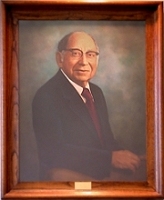Founding Partner Gilbert Sussman’s “Simple Truths”
Gilbert Sussman 1905 – 1985

Gilbert Sussman was the founder and senior partner of Sussman Shank LLP until his death in 1985. Mr. Sussman attended the University of Oregon and Columbia University School of Law. From 1929 to 1934 he was a member of the staff at Yale Law School. He went on to become Senior Attorney for the Agricultural Adjustment Administration and NRA in Washington, D.C. After his return to Portland in 1935, Mr. Sussman was Regional Attorney for the U.S. Department of Agriculture and Assistant General Counsel, Bonneville Power Administration. In 1946 he entered private practice in Portland. In 1960 he founded our firm.
Gil was recognized as a dean of the Oregon bankruptcy bar. During his career, he was involved with many of the largest bankruptcy and reorganization cases in the state.
Gil was a leader and innovator in both national and local legal organizations. It was a testimonial to his standing with the bar and in his own community that his point of view was so readily accepted on several issues of the times.
Gil was also an officer and member of the Portland City Club and a director of the Portland Chapter of United Good Neighbors. He was also active in many other civic and religious organizations, yet still found time to indulge his enthusiasm for gardening.
By Howard M. Levine and Kevin D. Padrick
When Gilbert Sussman founded the firm in 1960, he brought with him a philosophy of conduct that earned him great respect among clients and colleagues alike. Today, Simple Truths form the foundation of honorable legal work and serve as the credo by which the firm continues to practice.
A Lawyer Trades on His or Her Reputation
A baker has his bread, a furniture maker has his chair, but a lawyer’s product is the elusive and intangible word. Gil understood that the value of a lawyer’s word was directly related to his or her reputation in the community and the esteem in which the listener held the speaker. Esteem is earned over time, but can be lost suddenly and permanently if the speaker is caught in a lie. Gil taught us that no client or case is worth the cost of losing our reputation. He did not manipulate the concept of truth. Not only did Gil always give us the truth, he gave us the whole truth.
When asked about his willingness to exploit another lawyer’s misunderstanding, Gil would patiently inform the questioner that trust and respect are not fostered by the mere avoidance of dishonesty. Gil wanted his listener’s trust and respect and knew that momentary gains resulting from exploitation of another lawyer’s failures would at best provide only a short-term benefit to his present client. He knew that keeping the trust and respect of his foes would ultimately be more advantageous to his present client and all future clients.
Let Your Adversary Walk Away with Dignity
Human beings are vulnerable and have emotions. Gil read his adversaries, as would any excellent attorney. He sensed their weaknesses and evaluated their strengths. But Gil never attacked another lawyer personally to gain an advantage for himself or his client.
Gil liked being a lawyer. He believed that the practice of law was a dignified profession. He believed that to destroy the dignity of a lawyer would be to destroy the dignity of the profession. He treated even the most junior lawyers with courtesy and respect. Gil rose above his adversaries’ weaknesses. He fought hard, but he fought fair. When he won, he seldom rejoiced in public, and he never reminded an adversary of his defeat. Experience had taught Gil that he was most effective in advocating his client’s position (either in court or through his usual course of negotiating an advantageous settlement) if his adversaries knew that even if Gil “whipped the pants off them” he would always leave them clothed in their own dignity.
Leave Your Adversary Cab Fare Home
Gil believed that every dispute was capable of a negotiated settlement. Gil’s settlement technique was simple. He evaluated a matter thoroughly to determine a settlement advantageous to both sides and then proposed the settlement to his adversary. Gil’s settlement technique demanded that he develop empathy for his adversary’s position. By understanding his adversary’s needs and goals, Gil could effectively maximize his client’s position while also allowing his adversary to satisfy some of his needs and realize a number of his goals. He would often say to his adversary that “a settlement that is good for my client is not necessarily bad for yours.” Although Gil was not formally trained in psychology, he had an instinct sharpened through experience that allowed him to evaluate his adversary better than any psychologist employing Maslow’s hierarchy of needs. To Gil, a good settlement was not one where everyone was equally dissatisfied with the result. Instead, a good settlement was one in which everyone believed that they had won.
Pay Attention to the Economics of the Case
Gil always tried to find solutions that made good business sense. When a particularly self-righteous adversary insisted on taking undue advantage, Gil might be heard to remark, “Look, does your client want blood or money? If he wants money, we can help him.” He had a knack for making people focus on workable plans, rather than on winning or losing.
If You’re Going to Stab, Stab in the Chest, Not the Back
Dark alleyways were not Gil’s hangouts. Lighted stadiums were more characteristic of his style. Gil had supreme confidence in himself and his arguments. He did not need to take advantage of his adversary’s lack of attention.
Gil liked the challenge of a fair fight. Fairness demands knowledge, fair warning, and an opportunity to protect oneself. Gil always gave his adversary such knowledge, warning, and opportunity. Gil believed that justice was dependent on a complete examination of all facts. If one party was not given an adequate opportunity to explore the facts, justice might not be done. He believed that when injustice occurs, appeals result, costs and expenses multiply, trust is destroyed, communications cease, battle lines are drawn, and the negotiated solution is lost forever.
Conclusion
Gil was in it for the long haul. Clients sought him out because of his reputation, the product of many years of consideration, honesty, and integrity. He was an effective advocate who earned our respect and admiration. All of Gil’s Simple Truths boil down to the ultimate simple truth: “Do unto others as you would have them do unto you.”
Editor’s Note
This article was first published in 1986, shortly after Gilbert Sussman died. At that time, co-author Howard M. Levine was an associate with Sussman Shank LLP and worked closely with Gilbert Sussman. Kevin D. Padrick was with the Portland law firm of Miller Nash LLP and frequently represented positions adverse to Mr. Sussman’s.






